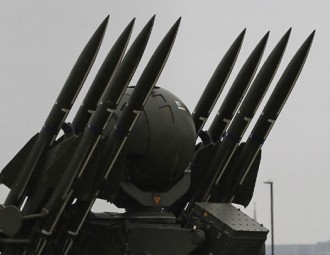Miachyslau Hryb: Manufacture of weaponry in Belarus is certainly not for breaking up Maidan

Modern armament is required for fighting with some regular army. But with what army exactly, wonders Miachyslau Hryb, the former Chairman of the Supreme Soviet of Belarus.
Belarusan leader Aliaksandr Lukashenka set an ambitious goal to create a complete closed cycle for manufacturing advanced weaponry from means of mobility to means of destruction. “If you want peace, prepare for war”. “We are not in danger of a war at present but the army has to be kitted out in a timely manner, - Lukashenka said. - If we are ready to respond to any challenges, including similar ones, no war will happen. Unfortunately, wars evolve. And we have to evolve, too”.
- I think, one can say whatever he wants if one is too fond of talking. But it is very hard and difficult to establish such manufacturing, - noted Miachyslau Hryb, the former Chairman of the Supreme Soviet of Belarus and retired lieutenant general of police in the talk with a correspondent of the “EuroBelarus” Information Service. – If it were easy to create such closed cycle for manufacturing advanced weaponry in the country, then every state would start doing that. And nobody would by anything from anyone. But as you see, there are only several countries in the world that are producing weapons and selling it. The rest have to buy. Of course, if such chain is created, it will be a seller; but imagine how much one would have to invest in the manufacture! Only very rich countries can afford that; all the more if we are talking about advanced development.
It is no coincidence that Lukashenka recalled Ukrainian question, Miachyslau Hryb notes.
- As to all the different references to Ukraine, every other man and his dog do that. All are using Ukrainian issue in their personal interests. It is clear that Lukashenka wants to distance himself as far as possible from Vladimir Putin. And Mihail Miasnikovich’s voyage to the US is quite understandable, too. Obviously, Belarusan leader wants to distance himself from Kremlin. Ukraine scared its neighbors a lot. They don’t know what to do and what to say. Maidan and its developments are also scary, I think. Many political scientists and experts forecast that under certain conditions something similar might happen in Belarus, too. And thee conditions are not that numerous, and they are obvious. As soon as Belarus starts turning its back to the EU and the West in general there are no guarantees that the Ukrainian scenario won’t be repeated in Belarus, which is, of course, alarming. Let me also note that advanced weaponry is hardly used against Maidans. Such weaponry is used against some other enemy, against regular army. But against which army?
-
03.01
-
07.10
-
22.09
-
17.08
-
12.08
-
30.09








































